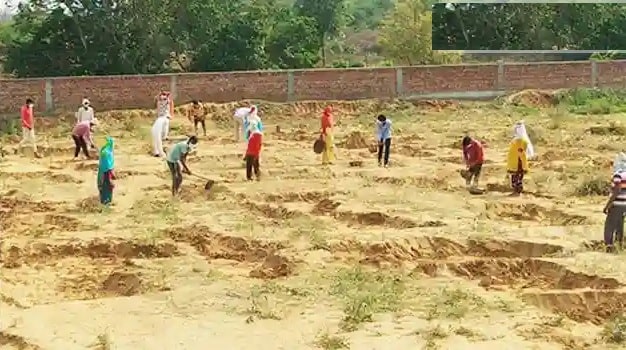

At a time when West Bengal CM Mamata Banerjee led TMC has protested against the Narendra Modi government “not releasing MNREGA funds”, the Centre has released a report saying its allegations are false.
In a report issued by Press Information Bureau, it is said that Mahatma Gandhi National Rural Employment Guarantee Act (MGNREGA) is a demand-driven wage employment programme and fund release to States/UTs.
It is a continuous process and the Central Government is making funds available keeping in view the demand for work. The Ministry release funds to the States/UTs based on the basis of agreed to Labour Budget (LB), opening balance, pending liabilities of the previous year, if any, and overall performance. The Ministry seeks additional fund for MGNREGS as and when required to meet the demand for work on the ground.
Funds of State of West Bengal have been stopped from March 09, 2022 as per provision of Section 27 of Mahatma Gandhi National Rural Employment Guarantee Act, 2005 “due to non-compliance of directives of Central Government.”
The Budget/Revised Estimates and Fund released under Mahatma Gandhi NREGS during the last three financial years and current FY 2023-24 (as on 04.10.2023) is as under:
(Rs. in crore)
|
Year |
Budget Estimate |
Revised Estimate |
Fund released |
|
2020-21 |
61,500.00 |
1,11,500.00 |
1,11,170.86 |
|
2021-22 |
73,000.00 |
98,000.00 |
98,467.85 |
|
2022-23 |
73,000.00 |
89,400.00 |
90,810.00 |
|
2023-24 |
60,000.00 |
- |
* 56,105.69 |
(*as on 04.10.23)
Availability of funds is not a constraint for the implementation of the program.
To ensure that Mahatma Gandhi NREGA workers receive their wages on time, National Electronic Fund Management System (NeFMS) has been put in place. The Ministry has been making all efforts to pay wages in time. States/ UTs have been advised to generate pay orders in time. This has resulted in considerable improvement in the status of timely generation of pay order and leading to improvement in actual time taken to credit wages in the workers account. During the current financial Year 2023-24 (as on 04.10.2023), 99.12% pay orders have been generated within 15 days. The delay in payment of wages are due to implementation issues in the States which include inadequate staffing, measurement, data entry, generation of wage list, Fund Transfer Order (FTO), etc. In case of delay in wage payment,the beneficiary is entitled for delay compensation as per the provisions.
Job card of household can be deleted only in certain specific conditions, but not due to Aadhaar Payment Bridge System (APBS). Updation/deletion of Job Cards is a regular exercise conducted by the States/UTs. A Job card can be deleted in case, it is a fake job card (incorrect job card)/ duplicate job card/ household not willing to work/ family shifted from Gram Panchayat permanently/ single person in job card and that person is expired.
APBS is nothing but a route through which the payment is getting credited in the account of beneficiaries. There are well defined steps adopted in this system and role of beneficiaries, field functionaries and all other stakeholders is clearly defined.
It has been brought to the notice of the Central Government that in many cases due to frequent changes in Bank Account Number by the beneficiary and non-updating of the new account number by the Concerned Programme Officer of the same, due to non-submission of new account by the beneficiary on time, several transactions of wage payment are being rejected (due to old account number) by destination bank branch.
In consultation with different stakeholders, it is found that to avoid such rejections, APBS is the best route for making wage payment through Direct Benefit Transfer (DBT). It will help the beneficiaries in getting their wage payment on time.
Once Aadhaar is updated in the scheme database, beneficiary need not update account numbers due to change in location or change in bank account number. Money will be transferred to the account number which is linked with Aadhaar number. In case of more than one account of the beneficiary, which is rare in the context of Mahatma Gandhi NREGS, beneficiary has the choice to select the account.
The National Payments Corporation of India (NPCI) data shows that there is higher success percentage to the extent of 99.55% or above where the Aadhaar is enabled for DBT. In case of Account based payment such success is about 98%.
APBS is helping the genuine beneficiaries to get their due payment and is instrumental in curbing corruption by weeding out fake beneficiaries. This scheme has opted for Aadhaar Based Payment Bridge system (APBS). The progress of APBS has been reviewed and the mixed route of wage payment (NACH and ABPS route) has been extended till 31st December 2023 or till further order.
Ministry has made it clear to all the States that the beneficiary who comes for work should be requested to provide the Aadhaar number but will not be refused work on this basis. If a beneficiary does not demand for work, in such case her/his status about eligibility for APBS does not affect the demand for work. Job cards cannot be deleted on the basis of reason that the worker is not eligible for APBS.
Till date, a total of 13.99 crore Aadhaar seeded in Management Information System (MIS) which is 97.87% of total Active workers and 84.78% of active workers are now eligible for APBS.